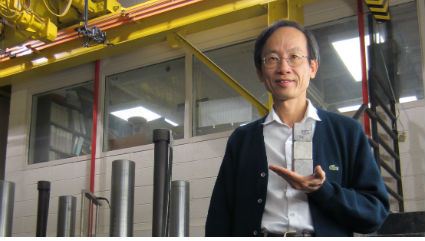
Concrete is second only to water as the most widely used substance on Earth. Unfortunately, its production is one of the single largest contributors of environmentally harmful carbon dioxide emissions. In 2002, Associate Professor of Civil and Environmental Engineering Hwai-Chung Wu set out to create environmentally friendly cement. His work led to “green” cement, aptly named for the city it was created in.
According to Professor Wu, Detroit Cement is much better for the environment than traditional cement.
“Cement production is tough on the environment because it requires so much heat,” said Wu. “It takes far less heat to create Detroit Cement, meaning about 50 percent less carbon dioxide is released into the atmosphere during its production.”
In addition to the environmental benefits, Wu’s creation performs better than traditional cement. Its plastic-like molecular composition means the material has a greater degree of flexibility, which equates to less cracking—a common issue seen in structures and roadways.
Wu’s discovery is moving closer to full-scale commercialization, and the university filed for a patent in 2012.
